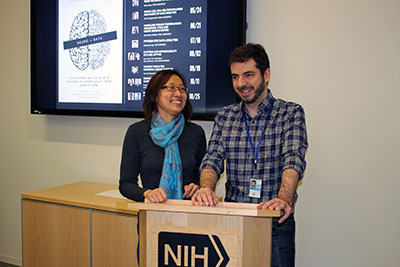The Training Page
Do-It-Yourself Training

CREDIT: JILLIAN H. KLUSS, NIA
Ruth Chia (left) and Adamantios Mamais, who worked together to start a training program in which fellows teach fellows, welcomed attendees at a recent seminar. Chia and Mamais are pleased that many fellows, once they’ve been to a seminar, volunteer to teach.
Fellows can now get peer-to-peer training on the latest scientific topics and techniques. Since 2017, Ruth Chia (then a research fellow and now a staff scientist) and Adamantios Mamais (visiting fellow) at the National Institute on Aging (NIA) have been organizing seminars in which fellows teach fellows topics ranging from managing big data to conducting machine learning in genetics. The pair hopes to create more opportunities for fellows to feel comfortable teaching and learning from each other.
Mamais and Chia, who are both in NIA’s Laboratory of Neurogenetics (LNG), came up with the idea of running a seminar on big data and cell-morphology analysis as a way to integrate and share their skills with other trainees. Their seminar was well-attended and received with great enthusiasm. During an LNG retreat, the lab’s fellows expressed an interest in having more training and teaching opportunities, and their enthusiasm grew for a seminar series that emphasized peer-to-peer training.
Chia and Mamais then organized a program that allowed postdocs to not only teach new knowledge but also demonstrate skills for conducting science in a real-life setting. Each seminar is about two hours long and includes a lecture and hands-on training, Mamais explained.
Without this demonstration portion, “the details between A [and] Z [of the science] are left out,” said Chia. These seminars “highlight the nitty-gritty tips of how to do a scientific [technique] that you can’t learn from a textbook.”
Although seminars are organized by NIA fellows, trainees from other institutes and centers (ICs) are welcome to attend. Typically, 20 to 30 people attend each seminar, and fellows from more than a dozen ICs have participated.
Chia and Mamais have also developed assessment tools to evaluate the seminars. Feedback has been positive and encouraging so far. Past seminars received an “excellent” or “very good” rating and appear to have increased the fellows’ scientific knowledge and skills. On average, only 10 percent of the attendees rated themselves as having a “very good” or “excellent” knowledge or skill in the subject matter before each seminar. Afterward, about 70 percent reported their knowledge had improved.
Chia and Mamais are pleased that many fellows, once they’ve been to an LNG seminar, volunteer to teach. Thinking ahead, Chia and Mamais plan to work as a team and recruit other organizers on a rolling basis. They have even thought about forming a committee of fellows to run the series. Their success comes in part from the support they’ve received from their PIs, including the chief of the LNG, Andrew Singleton. The seminars “are a great example of junior folks taking control,” he said. “They’ve taken care of everything—the agenda, [determining] what’s of interest, and [figuring out] ways to self-assess. It’s a great training opportunity on several levels.”
NIH fellows have many exciting new workshops to look forward to in 2019 including “Tracing Tools for Neuronal Circuit Mapping” and “Python for Data Analysis.” Don’t worry if these topics are completely new to you. Fellows are encouraged to “just come,” said Chia. “You don’t need any background.”
Chia and Mamais hope these seminars will break barriers to learning, provide teaching opportunities, and ultimately create a support network among fellows.
The 2019 seminars are held in Building 35, Room GG 607, from 10:00 a.m. to noon. For more information and a schedule, contact Adamantios Mamais (adamantios.mamais@nih.gov) or Ruth Chia (ruth.chia@nih.gov).
This page was last updated on Monday, April 4, 2022
